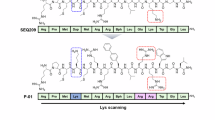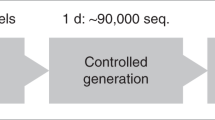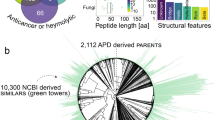Abstract
Thanatin and s-thanatin were insect antimicrobial peptides which have shown potent antimicrobial activities on a variety of microbes. In order to investigate the effect of cations and pH on the activity of these peptides against Gram-negative bacteria and Gram-positive bacteria, the antimicrobial activities of both peptides were studied in increasing concentrations of monovalent cations (K^+^ and Na^+^), divalent cations (Ca^2+^ and Mg^2+^) and H^+^. The NCCLS broth microdilution method showed that both peptides were sensitive to the presence of cations. The divalent cations showed more antagonized effect on the activity against Gram-negative bacteria than the monovalent cations, since the two peptides lost the ability to inhibit bacterial growth at a very low concentration. In addition, the activities of both peptides tested were not significantly affected by pH. Comparing to studies of other antibacterial peptide activities, our data support a hypothesis that positive ions affect the sensitivity to cation peptides.
Similar content being viewed by others
Article PDF
Author information
Authors and Affiliations
Corresponding author
Rights and permissions
About this article
Cite this article
Wu, G., Ding, J., Li, H. et al. Effects of Cations and PH on Antimicrobial Activity of Thanatin and s-Thanatin against Escherichia coli ATCC25922 and B. subtilis ATCC 21332. Nat Prec (2008). https://doi.org/10.1038/npre.2008.2006.1
Received:
Accepted:
Published:
DOI: https://doi.org/10.1038/npre.2008.2006.1



